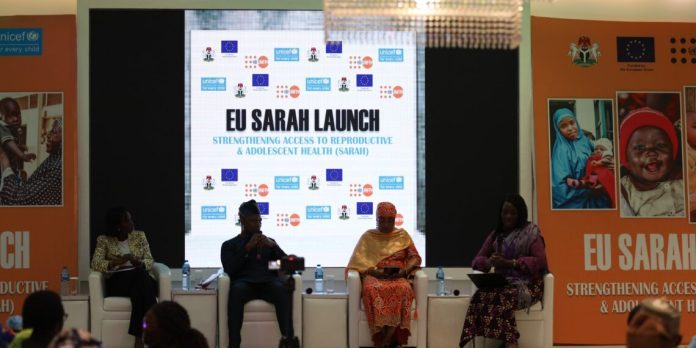The European Union (EU), in collaboration with the Federal Government of Nigeria, the United Nations Population Fund (UNFPA), and UNICEF, launches the €40 million Strengthening Access to Reproductive and Adolescent Health (SARAH) programme.
The initiative, introduced on December 11 in Abuja, focuses on improving reproductive health services for women and adolescents in Sokoto, Adamawa, and Kwara states.
The Minister of Health and Social Welfare, Professor Muhammad Pate, represented by Dr. John Ovuoraye, Director of the Gender, Adolescent, Social Health, and Elderly Division, commends the EU’s investment in addressing Nigeria’s healthcare challenges.
“This programme targets critical health issues affecting Nigerians. We appreciate the EU’s support in joining forces with the government to deliver meaningful and sustainable health solutions,” Pate states.
Ambassador Gautier Mignot, Head of the EU Delegation to Nigeria and ECOWAS, represented by Dr. Anthony Anyeke, outlines the SARAH programme’s objectives. Over four years, the initiative focuses on strengthening healthcare data systems, enhancing service delivery, and expanding access to quality reproductive healthcare across the targeted states.
“The EU remains dedicated to promoting accessible healthcare, informed choices, and effective partnerships among stakeholders,” Mignot affirms, urging stakeholders to ensure access to essential sexual and reproductive health services.
Dr. Amina El-Imam, Kwara State Commissioner for Health, representing her counterparts from Sokoto and Adamawa, highlights the potential impact of the SARAH programme.
“This funding allows us to make significant strides in improving the health of children, adolescents, and women. It is essential to use these resources effectively to achieve measurable results,” El-Imam emphasizes.
UNFPA Deputy Country Representative, Mr. Koesson Kuawu, stresses the programme’s focus on integrating gender-responsive and adolescent-inclusive healthcare into primary health services.
“This initiative strengthens access to quality health services at the national, state, and community levels, ensuring inclusivity and accessibility,” Kuawu explains.
UNICEF Country Representative, Ms. Cristian Munduate, describes the programme as a strategic investment aligned with Nigeria’s broader health agenda.
“This initiative is about creating a healthier, more resilient future for Nigeria, ensuring every woman, adolescent, and child has the chance to thrive,” Munduate asserts.
The SARAH programme is set to advance reproductive and adolescent health, laying the foundation for improved healthcare systems and better health outcomes across Nigeria.











